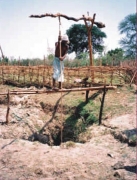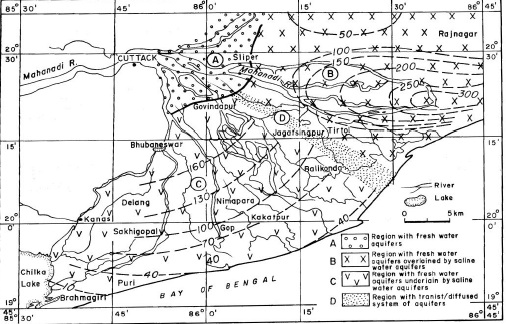Ecology and Environment
Ashoka Trust for Research in Ecology and the Environment (ATREE)'s Small Grants Programme
Posted on 16 Jul, 2010 04:46 PMContent Courtesy: Ashoka Trust for Research in Ecology and the Environment (ATREE)
Call for proposals
ATREE, Bangalore invites project proposals on conservation from civil society organizations such as NGOs, community based organizations, academic organizations and individual researchers..
Grant details
Ashoka Trust for Research in Ecology and the Environment (ATREE)’s small Grants Programme recognizes that there is a wealth of information and expertise at small scales that can be drawn upon for more effective conservation. The small grant will support 7 – 8 proposals in each of the two areas of focus. The topics under each focal area are only an indicative list.
A rapid geohydrological study of microwatersheds from Bolangir district, Orissa state - A report by ACWADAM
Posted on 16 Jul, 2010 03:50 PM This document by ACWADAM is a report of a rapid geohydrological assessment of some of the microwatersheds from parts of Bolangir district Orissa.
This document by ACWADAM is a report of a rapid geohydrological assessment of some of the microwatersheds from parts of Bolangir district Orissa.
Bolangir district in Orissa forms a part of one of the hottest and backward regions of India with low land-productivity, and opportunities and technologies for agriculture in the district remain relatively unexplored.
Vagaries of rainfall and the underlying hard-rock geology further compound the problem and limit agricultural productivity to a great extent. Given such natural uncertainties, systematic implementation of a watershed management programme is the most viable avenue to overcome the problems of this region.
Bolangir district was thus selected as pilot area to conduct a pre-feasibility exercise for planning of water resources management. ACWADAM, Pune was invited, along with Samaj Pragati Sahayog, Bagli to conduct this pre-feasibility exercise.
Need for real-time DSS for flood management
Posted on 13 Jul, 2010 01:07 PMFloods are common in most parts of India particularly during the monsoon season. Flood control and mitigation involves flood plain mapping, zoning, insuring and warning systems as floods cannot be avoided. These measures minimize damage and loss in terms of life and property. In this regard real-time data based decision supports systems (DSS) are crucial for effective flood management.
Hydrological problems in the Kandi belt of Jammu region – A research report by National Institute of Hydrology
Posted on 12 Jul, 2010 09:09 PMThis report is a compilation of the status of natural resources as well as of the hydrological problems & constraints being faced in the Kandi belt of Jammu region of Jammu & Kashmir. Suitable actions and methods are recommended to tackle these problems in the study area.
Seeds of hope - Case studies from the Planning Commission and Lokayan
Posted on 12 Jul, 2010 03:33 AMThis set of case studies is part of a book prepared by Lokayan in collaboration with the Planning Commission titled “Seeds of Hope", covers themes of agricultur
Providing a plan to save civilization - Books from the Earth Policy Institute
Posted on 11 Jul, 2010 05:24 AM Earth Policy Institute, is a non-profit environmental research organization dedicated to providing a vision of an eco-economy and a roadmap on how to get there. The Institute was founded in 2001 with the following goals:
Earth Policy Institute, is a non-profit environmental research organization dedicated to providing a vision of an eco-economy and a roadmap on how to get there. The Institute was founded in 2001 with the following goals:
- to provide a global plan (Plan B) for moving the world onto an environmentally and economically sustainable path
- to provide examples demonstrating how the plan would work, and
- to keep the media, policymakers, academics, environmentalists, and other decision-makers focused on the process of building a Plan B economy.
The basic research of the Institute has been published in the form of seven books:
A study of saline freshwater interface phenomena in the Mahanadi delta region (Orissa)
Posted on 10 Jul, 2010 10:40 PM The subsurface aquifer systems in Mahanadi delta region in Orissa (India) is largely characterized by two groups of freshwater aquifer systems, both of which are prone to saline water mixing/migration with time and development:
The subsurface aquifer systems in Mahanadi delta region in Orissa (India) is largely characterized by two groups of freshwater aquifer systems, both of which are prone to saline water mixing/migration with time and development:
- The south western Mahanadi delta region is represented by unconfined to semi-confined freshwater aquifers underlained by brackish/saline aquifer systems with a diffusion boundary.
- The north eastern parts of Mahanadi delta is represented by deep freshwater confined aquifers overlained by brackish/saline water aquifers with aquitard/ aquiclude boundary.
Draft regulatory framework for wetlands conservation - Comments by ATREE
Posted on 09 Jul, 2010 11:49 PMThe Ministry of Environment and Forests released a draft of the regulatory framework for wetland conservation - Wetlands Conservation and Management Rules (2009) for feedback from all stakeholders. The draft framework was prepared by a multi-disciplinary expert group, and final round of comments were invited till June 21st 2010.
The Wetland Conservation Team of Ashoka Trust for Research in Ecology and the Environment (ATREE) did a detailed analysis of the draft regulation and submitted several pertinent concerns to the Ministry. The most significant observation is that the new framework (as do much of India's policies and laws) continues to propose unjustifiable State control and interventions over the country's wetlands and livelihoods of people dependent on them. The regulation does not make any constructive suggestions or recommendations for the conservation that the country's wetlands demand, and instead brings all wetlands into complete official control by installing Central, State and District-level wetland regulatory authorities, wherein the majority of the members will be senior government officials.
Conservation of lakes - Myths and realities of desilting
Posted on 09 Jul, 2010 11:11 PMDesilting is becoming a major component of any Lake Conservation Project now a days. The basic reasons given for necessity of desilting are - increasing the storage capacity and checking eutrophic conditions.
As it is not practicable to reverse the slow process of silting in the bed of lakes through which only silt can be removed, there is no word like 'desilting' in any standard English dictionary. What we are doing in the name of 'desilting' is practically 'digging' or 'excavation' of lake bed. By so called desilting, the original lake bed is disturbed which has far reaching adverse effects on the performance of the lake. Most visible effect is the increase in percolation rate resulting in heavy seepage losses through the lake bed as observed after massive desilting at Pushkar lake in 2009.
Fundamentals of Environmental Pollution and Control - NPTEL Mining Engineering Course
Posted on 30 Jun, 2010 11:26 PMFundamentals of Environmental Pollution and Control is a course offered by NPTEL under Mining Engineering, and is structured into 28 video lectures along the following topics:
- State of the Environment
- Environmental Movement
- Definitions of Environmental Terms




